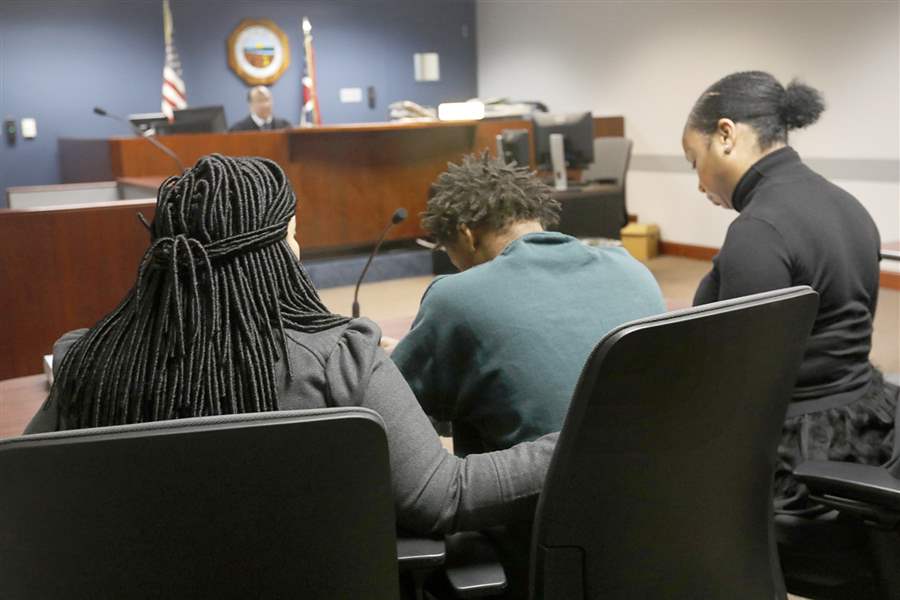
Key differences in juvenile, adult court systems
1/4/2018
Demetrius Wimberly, 14, center, is comforted as he is arraigned on the charge of murder Wednesday, December 27, 2017, at Lucas County Juvenile Court in downtown Toledo. Wimberly is one of four boys charged in the death of Marquise Byrd, 22.
THE BLADE/KATIE RAUSCH
Buy This Image
Anytime juveniles are accused of serious crimes, Lori Olender, deputy chief of the juvenile division of the county prosecutor's office, hears the public’s cries to charge the defendants as adults.
The murder case before the Lucas County Juvenile Court Thursday was no different.
Pedro Salinas, 13; Sean Carter, 14; Demetrius Wimberly, 14; and William Parker, 15, appeared accused of murder and vehicular vandalism. Police say the four boys on Dec. 19 threw a sandbag from the Indiana Avenue bridge over I-75 that struck Marquise Byrd, 22, a passenger in a vehicle below.

Demetrius Wimberly, 14, center, is comforted as he is arraigned on the charge of murder Wednesday, December 27, 2017, at Lucas County Juvenile Court in downtown Toledo. Wimberly is one of four boys charged in the death of Marquise Byrd, 22.
RELATED: 4 Toledo teens face murder charges after sandbag tossed from overpass
Mr. Byrd died three days later, prompting the murder charge in juvenile court, where the case will stay, Ms. Olender said.
Ohio law does not let prosecutors decide whether or not to charge youths in an adult court. Instead, a prosecutor can file a motion asking a judge to make that call, based on several factors that strictly limit who can be moved out of the juvenile system.
That motion has to show, with clear and convincing evidence, that the defendants are not amenable to justice in the juvenile system, Ms. Olender said. To start, Ohio law does not allow anyone younger than 14 to be moved into the adult courts, guaranteeing that the Salinas youth will be adjudicated within the juvenile system.
“There is absolutely no vehicle for it,” Ms. Olender said.
Since the remaining teens are all younger than 16, the court would then weigh a laundry list of factors, including the sort of harm done by the action, past findings in juvenile court, whether a firearm was used in the crime or if it was connected to gang activity, and if the child is considered mature enough to be transferred into a criminal proceeding.
Looking at that list, Ms. Olender said she believes there is no way to transfer the case.
“I can’t even ethically file that motion,” she said.
While remaining in juvenile court, the case will generally proceed in the same manner as an adult criminal case.
One exception is that no jury will be involved. Another difference is that the court is trying to determine whether or not a child is delinquent, rather than guilty.
The difference is not just a matter of terminology. No defendants are convicted in juvenile court, so no youths leave with a criminal record.
“It keeps kids from being criminals per se,” Ms. Olender said.
“In the juvenile system, you’re really trying to rehabilitate,” said Dennis Parish, a University of Toledo Law School professor and former Lucas County Juvenile Court magistrate. “In the adult system, it’s much more about retribution.”
That is part of the reason this court tends to require an admission or denial from defendants, unlike the adult system that allows Alford pleas so cases can resolve without a defendant admitting guilt.
“It’s this court’s philosophy that rehabilitation starts with an admission,” Ms. Olender said.
Without a serious youthful offender disposition, for which Ms. Olender said these teens are not eligible for most of the same reasons they cannot be tried as adults, no sentence can reach beyond a youth’s 21st birthday.
Contact Zack Lemon at zlemon@theblade.com, 419-724-6282 or on Twitter @zack_lemon.